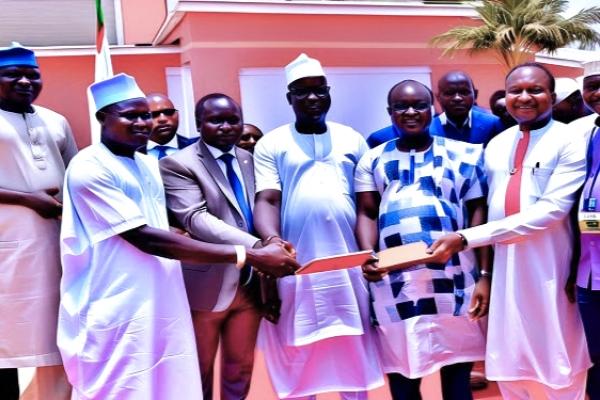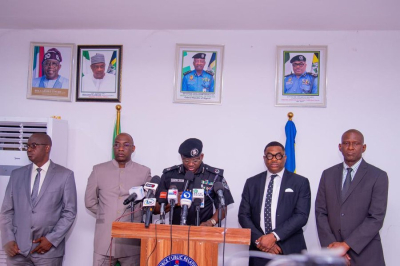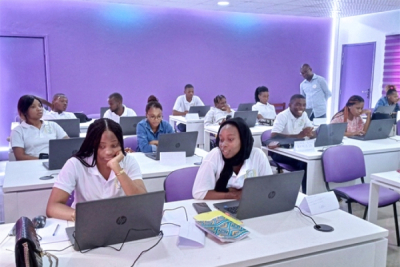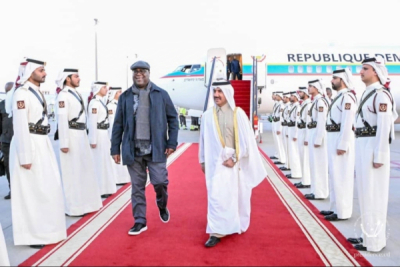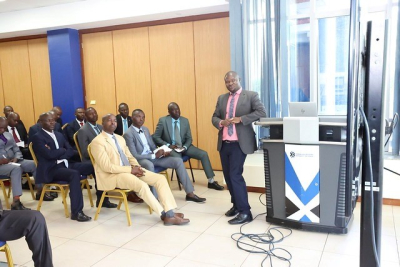
News (1796)
As organizations increasingly adopt cloud services and rely on sensitive data for decision-making, the demand for robust data protection measures has surged, particularly in Africa, which is experiencing rapid digital adoption and expanding its regulatory framework.
Spirion LLC, a U.S.-based data discovery, classification, and remediation company, announced on January 8 the opening of its first data center in South Africa. This marks the company’s third international expansion in just five months, following new facilities in Frankfurt, Germany (September 2024) and Sydney, Australia (October 2024).
“We’re thrilled to open our third global data center in just a few months. Protecting what matters most —sensitive data— requires accurate data discovery and classification,” said Spirion CEO Kevin Coppins.
The Cape Town data center is designed to support Spirion customers migrating to its Software-as-a-Service (SaaS) platform, enabling businesses to achieve automated and effective data security while adhering to South Africa's Protection of Personal Information Act (POPIA) and other data sovereignty regulations.
Spirion’s advanced solution allows organizations to uncover hidden data, classify it, and remediate risks to ensure compliance. The new facility will cater to growing local market demand while equipping South African companies with robust tools to secure sensitive information.
The launch aligns with Spirion’s recent enhancements to its Sensitive Data Platform (SDP), enabling businesses to manage massive data volumes with greater precision and scalability. The company’s advanced scanner node architecture now allows data analysis at petabyte-scale, offering unmatched visibility and control over critical data assets.
The move comes as South Africa’s data center colocation market experiences rapid growth. According to Research and Markets, South Africa's data center colocation market, valued at $330 million in 2023, is projected to grow to $780 million by 2029, with a compound annual growth rate (CAGR) of 15.42%. The projected growth of South Africa's data center colocation market signifies the increasing demand for digital infrastructure in the region, driven by rising data usage, cloud adoption, and the need for secure data storage. It highlights a strong trajectory of investment and expansion, reflecting the country's growing role as a digital hub in Africa.
Hikmatu Bilali
The Gambian government aims to accelerate the country’s digital transformation. In May 2024, the executive already established a partnership with the Emirati technology company Presight.
The Gambian Ministry of Communications and Digital Economy has partnered with the Kalp Foundation, a nonprofit organization dedicated to developing blockchain-based digital public infrastructure (DPI). This collaboration will lead to the creation of a decentralized platform called “Gambia One,” designed to secure data exchanges, streamline government operations, and digitize critical services.
“Together, we will harness the power of blockchain-enabled DPI to deliver innovative, citizen-centric solutions that align with global standards of trust, transparency, and accountability,” said Lamin Jabbi, Gambian Minister of Communications and Digital Economy. The partnership also includes capacity-building initiatives for government leaders and training programs focused on blockchain ecosystems and related technologies for young Gambians.
This initiative aligns with the Gambian government’s ambition to “leverage technology, digital solutions, and services to ensure digital inclusion by connecting the unconnected and under-connected, create jobs, and develop the economy.” It builds on earlier efforts, including a partnership established with the Emirati tech company Presight in May 2024. Additionally, in 2023, Gambia joined the Smart Africa Alliance, which promotes the use of ICT to accelerate economic and social development across Africa.
Currently, Gambia ranks 164th out of 193 countries in the 2024 E-Government Development Index measured by the United Nations Department of Economic and Social Affairs (UNDESA). The country scored 0.2552 out of 1, significantly below the averages for West Africa (0.3957), Africa (0.4247), and the global average (0.6382).
The timeline for launching the Gambia One platform remains unknown, as do the precise details of the agreement between the parties involved. However, the success of the initiative will depend on the population’s access to the internet and compatible devices. According to DataReportal, Gambia had 1.5 million internet users at the start of 2024, representing an internet penetration rate of 54.2%.
By Isaac K. Kassouwi,
Editing by Sèna D. B. de Sodji
Cybercrime has a broader ripple effect, increasing business costs and deterring foreign investment. Strengthening technical and organizational capacity will be crucial to maintaining investor confidence and accelerating economic diversification.
The Nigeria Police Force National Cybercrime Centre (NPF-NCCC) has achieved remarkable milestones in 2024, including the recovery of ₦8,821,001,881.80, 115,237.91 USDT, and $84,000, a press release dated January 7 revealed. These funds, reclaimed from cybercriminal activities, have been returned to victims, reflecting the unit's commitment to justice and protecting citizens from digital fraud.
ACP Olumuyiwa Adejobi, the Force Public Relations Officer, reiterated the NPF's commitment to staying ahead of cybercriminals and enhancing Nigeria's cybersecurity framework to ensure a safer digital environment for all.
In the past year, the NPF-NCCC arrested over 751 cybercrime suspects and confiscated 685 devices used in illegal activities, including 467 mobile phones, 137 laptops, 46 routers, and four Starlink devices. Additional recoveries include 16 houses, 39 plots of land, 14 land documents, and 26 vehicles, the release revealed.
For its exceptional performance, the unit was named Africa's Best Cybercrime Unit for 2024 by INTERPOL's Cybercrime Directorate, outperforming units from 54 African nations. This prestigious accolade underscores the NPF-NCCC's dedication to combating cyber threats and enhancing digital security.
The Nigeria Police Force remains resolute in safeguarding the digital space and urges citizens to practice cyber vigilance. Sharing sensitive information cautiously and fostering a culture of online responsibility are critical steps to reducing cyber threats.
Nigeria has been ranked as a Tier 3 "Establishing" country (score: 55–85) in the 2024 Global Cybersecurity Index (GCI) by the International Telecommunication Union (ITU). The GCI assesses countries on five pillars: legal measures, technical capabilities, organizational capacity, capacity building, and cooperation. The country scored 19.52 out of 20 in legal measures, reflecting the strength of its Cybercrimes (Prohibition, Prevention, etc.) Act of 2015, which supports prosecuting cybercriminals and securing digital transactions.
However, the Tier 3 ranking highlights gaps in technical capabilities, organizational capacity, and cooperation, revealing vulnerabilities in cybersecurity infrastructure. Limited resources for detecting and responding to threats leave critical sectors, such as banking and telecommunications, exposed to sophisticated attacks like ransomware. Broader enforcement and improved infrastructure are needed to strengthen the country’s defenses.
The recognition of the NPF-NCCC as Africa's Best Cybercrime Unit by INTERPOL is a testament to Nigeria’s capacity to tackle complex digital crimes. Historically, the country has faced criticism over weak law enforcement against cybercrime. This achievement marks a turning point, reinforcing global confidence in Nigeria’s commitment to cybersecurity.
Hikmatu Bilali
In today's rapidly evolving digital landscape, African countries are modernizing their education systems. Integrating digital technologies is crucial for addressing current educational challenges and creating a more inclusive and accessible learning environment.
Gabon’s Council of Ministers on Sunday approved a draft ordinance aimed at digitizing the country’s education system.
The ordinance seeks to integrate digital technologies and educational platforms into teaching and learning methods, according to a government statement.
"The draft ordinance aims to strengthen the legal and regulatory framework governing the transformation of teaching and learning methods through the integration of digital technologies and educational platforms," the statement said. "This reform is all the more urgent as the COVID-19 health crisis highlighted the need to develop alternatives to in-person teaching."
This decision aligns with the government's ongoing efforts to modernize the education system. In December, the government launched an inter-ministerial partnership to connect schools to the internet.
The anticipated outcomes of the digitization initiative include greater resilience in the education system during crises, reduced inequalities between urban and rural areas, and the modernization of teaching practices. The reform is also expected to help train a skilled workforce to support the country's economic transformation.
Samira Njoya
The Congolese government is banking on international cooperation to accelerate its digital transformation. In November 2024, a memorandum of understanding was already signed with Poland to develop digital infrastructure.
The Democratic Republic of Congo (DRC) and Qatar are exploring ways to strengthen bilateral cooperation in the information and communication technology (ICT) sector, among others. The issue was discussed during a meeting between Congolese President Félix Tshisekedi (photo, left) and Qatar's Emir, Sheikh Tamim bin Hamad Al Thani (photo, right), on Sunday, January 5, during an official visit to the Middle Eastern nation.
This rapprochement comes as the Congolese government intensifies its efforts under its vision of making "Congolese digital technology a lever for integration, good governance, economic growth, and social progress." In 2024, the country ranked 41st out of 47 African nations in ICT development, according to the International Telecommunication Union (ITU), with a score of 31 out of 100. Furthermore, official sources report that internet penetration in the DRC is at 30%, compared to about 50% for mobile telephony.
The United Nations Department of Economic and Social Affairs (UN DESA) ranked the DRC 175th out of 193 countries globally in e-government development in 2024, with a score of 0.2715 out of 1. This places the country below the regional averages for Central Africa (0.3354), Africa (0.4247), and the global average (0.6382).
Regarding cybersecurity, the ITU places the DRC in Tier 3, a category for countries that "demonstrate a basic commitment to cybersecurity through government-led actions, including assessment, establishment, or implementation of some generally accepted cybersecurity measures." The country faces significant challenges in areas such as technical measures, capacity building, and cooperation.
In contrast, Qatar boasts an ICT development score of 97.8 out of 100 and an e-government development score of 0.8244. The ITU also considers Qatar a global model in cybersecurity.
Strengthening collaboration with Qatar could provide the Congolese government with the support needed to develop its ICT sector and accelerate its digital transformation ambitions. However, the specific details of this partnership, including areas of intervention and implementation timelines, have yet to be defined. Moreover, no formal agreement has been signed or officially announced between the two parties at this time.
By Isaac K. Kassouwi
Editing by Sèna D. B. de Sodji
The telecommunications sector is a vital driver of Africa’s digital economy. Regulating the distribution and sale of equipment fosters a competitive and well-structured market, ensuring that businesses and consumers have access to reliable, high-quality devices, which are essential for comfortable user experience and growth.
Kenya has developed a new regulatory framework to enhance the telecommunications equipment market. The Telecommunication Equipment Distributor (TED) Licence, proposed by the Communications Authority of Kenya, aims to ensure compliance with industry standards, reduce e-waste, and promote accountability among distributors and vendors in the ICT sector. Stakeholders and members of the public have until January 23rd, 2025 to review the proposals and submit their feedback.
According to the Communications Authority, “the current review aims to remove certain market barriers identified over time, in line with the Authority’s mission of enabling regulation.”
The TED Licence will be required for wholesale suppliers of communication equipment, such as importers and distributors, and foreign manufacturers who wish to distribute their products locally. Kenyan manufacturers are exempt from this requirement but must sell their equipment exclusively to licensed TEDs. Local manufacturers wishing to distribute their products directly to vendors must still obtain a TED Licence. Licence holders must obtain type approval for all low-power communication equipment they sell, ensuring compliance with standards, a minimum one-year warranty, and spare parts availability.
The Licence will involve an application fee of Kshs. 5,000, an initial licence fee of Kshs. 250,000, and an annual operating fee of Kshs. 120,000 or 0.4% of gross annual turnover, whichever is higher. A total of Kshs. 375,000 ($2,883) for the beginning. The licence will be valid for 15 years.
This regulatory framework aims to standardize the telecommunications equipment market, enhance consumer confidence in ICT products, support sustainability by curbing e-waste, and foster fair competition by clearly defining the roles of manufacturers, importers, and vendors. By implementing these measures, Kenya is taking a significant step toward creating a more accountable and efficient telecommunications equipment market while promoting a sustainable and digitally inclusive future.
The move complies with Section 24(1) of the Kenya Information and Communications Act, 1998, which provides that “No person shall operate a telecommunication system or provide any telecommunication services except per a valid Licence granted under this Act. For players like Starlink, who market their telecommunications equipment, the new requirements may introduce additional costs, potentially affecting the pricing of their antennas in the market.
Hikmatu Bilali
After being absent from the global Startup Ranking in 2020, Algeria has now surged into the top 20 countries with the highest concentration of young tech entrepreneurs. In Africa, the nation ranks second, trailing only Nigeria.
The Algerian government is continuing to bolster digital innovation with new fiscal incentives introduced for 2025, building on a series of measures implemented over the past five years. These include exemptions from transfer duties on property acquisitions for startups and incubators to stimulate industrial activity, as well as a two-year extension of income tax (IRG) and corporate tax exemptions for incubators, contingent on the renewal of their official designation.
The government has also introduced exemptions from registration fees for the incorporation of companies led by holders of the "innovative projects" label. To encourage research and development (R&D), the 2025 Finance Act introduces tax deductions for expenses related to in-house R&D and open innovation programs contracted with startups or incubators.
"This deduction, applicable to the determination of taxable profit, is limited to 30% of the accounting profit, with a maximum cap of 200,000,000 Dinars (€1.4 million). If expenses cover both research and development and open innovation, the deduction cannot exceed this cap," the 2025 Finance Act stipulates.
Since 2020, Algeria has positioned digital innovation as a cornerstone of its economic development strategy. Recognizing its potential to drive job creation and wealth generation, the government established a dedicated ministerial position for the knowledge economy and startups. Subsequently, the national program "Algeria Disrupt" introduced a regulatory framework fostering innovation, including provisions for certifying innovative digital enterprises.
In 2021, the Algerian Startup Fund was launched as a public financing mechanism combining investment and venture capital for high-growth innovation projects. Two years later, in 2023, the Algerian Innovation Fund was created as a collaboration between the public accelerator Algeria-Venture and the international Small Enterprise Assistance Funds (SEAF).
During a meeting between the Government and local government officials on meeting on January 19, 2023, then-Minister Yacine El Mahdi Oualid highlighted Algeria's progress, reporting over 5,000 startups registered with the ministry, including 1,100 certified as “startups” or “innovative projects.” He also noted the expansion of incubators, which grew from 14 in 2020 to 60 by 2023, covering the entire national territory.
By Muriel EDJO,
Editing by Sèna D. B. de Sodji
Africa has been making significant strides towards digital transformation, with growing adoption of mobile internet, fintech innovations, and e-commerce platforms. Internet shutdowns hinder the everyday functioning of these sectors and create a sense of instability, discouraging investments and limiting opportunities for startups and entrepreneurs.
In 2024, Sub-Saharan Africa faced significant economic losses from deliberate internet shutdowns, totaling $1.56 billion, or 20% of the global economic impact, according to Top10VPN data. These disruptions impacted 111.2 million users -17% of the global total- across 32,938 hours of downtime, severely affecting the region's digital economy.
Sub-Saharan Africa’s internet disruptions were mainly driven by conflict and political unrest. Sudan was the hardest hit, losing $1.12 billion (71.8% of the region's total loss), as internet services were shut down to control protests and suppress information. This affected 23.4 million people over 12,707 hours. Ethiopia followed with a loss of $211.2 million, while Kenya experienced a $75 million loss. Although Ethiopia incurred a higher financial loss, the Kenyan outage affected 22.7 million people over 511 hours, compared to 3.3 million in Ethiopia over 4,680 hours.
In contrast to the frequent but less economically damaging shutdowns for exams, which are common in the region, conflicts and information control were the top reasons for internet restrictions. The ongoing Sudanese conflict, along with unrest in countries like Ethiopia resulted in some of the longest and most costly shutdowns in Africa. These shutdowns caused long-term disruptions in business, access to essential services, and social media platforms, which are increasingly vital for communication and economic activity.
Social media platforms like Twitter (X) and TikTok were often blocked, reflecting governments’ efforts to control information flow during political instability. For instance, Twitter’s extended shutdown in countries like Nigeria and Sudan led to significant disruptions for citizens and businesses that use the platform for networking, marketing, and information-sharing.
Internet shutdowns in Africa have significant economic and innovation costs, especially for startups in fintech and e-commerce. As mobile technology and internet access grow, these disruptions threaten the region's digital economy. Shutdowns disrupt communication, business activities, and essential services, deepening the digital divide and hindering economic growth.
In conclusion, the economic impact of internet shutdowns in Sub-Saharan Africa in 2024 highlights the urgent need for resilient digital infrastructure, better governance, and greater advocacy for digital rights. These challenges serve as a reminder of the central role the internet plays in Africa's development and the risks posed by internet shutdowns to economic and social progress.
Hikmatu Bilali
Mauritanian authorities are pressing ahead with a national digital transformation strategy aimed at making technology a key driver of the country's socio-economic development.
Mauritania launched its electronic visa (e-visa) system last week. According to a statement issued by the Ministry of Foreign Affairs, from January 5 on, all travelers needing a visa should obtain it online before boarding flights to the country.
Applications must be submitted through the website of the National Agency for Population Register and Secure Titles (ANRPTS). The e-visa requirement applies to all nationalities except those with reciprocal visa waiver agreements with Mauritania, which include 18 countries, 10 of them African: Morocco, Algeria, Tunisia, Libya, Mali, Senegal, Gambia, Niger, Côte d’Ivoire, and Chad. In some cases, such as with Morocco, the exemption is limited to diplomatic and service passports.
The e-visa system aligns with the government's "National Digital Transformation Agenda 2022-2025" and is expected to simplify foreign entry, potentially boosting tourism. This supports the government's 2018-2030 National Tourism Strategy.
Mauritania's tourism sector GDP generated 1.8 billion ouguiyas ($45.05 million) in 2021 and is projected to reach 2.2 billion ouguiyas by 2025, according to an IMF report. The IMF noted the sector has "significant potential" but requires development of a tourism offering tailored to both domestic and international visitors, along with strengthened territorial security.
By Isaac K. Kassouwi,
Editing by Sèna D. B. de Sodji
Smuggled phones often bypass safety standards and lack warranty coverage, leaving consumers vulnerable to defective products. By introducing mechanisms to curb smuggling, African governments can close loopholes, improve oversight, and protect consumers.
Egypt’s Finance Ministry and the Ministry of Communications and Information Technology have jointly launched a new electronic mechanism featuring a mobile application named "Telephony" (My Phone) to tackle mobile phone smuggling and promote the localization of mobile phone manufacturing. The new system, announced on December 31, aims to ensure fair competition in the Egyptian mobile phone market, which has recently attracted several international companies to manufacture various models locally.
According to a joint statement issued by the ministries, the mechanism will allow citizens returning from abroad to bring one mobile phone for personal use exempt from fees, provided it is registered through the "Telephony" application. This exemption will be valid for three months.
The application enables users to register imported mobile phones online, inquire about and pay any applicable fees electronically. It also aims to safeguard consumers from counterfeit and smuggled devices while streamlining customs procedures.
Customs duties and taxes on imported mobile phones will remain unchanged under the new system, which takes effect on January 1, 2025. Taxes and duties on imported mobile phones have been levied at 38.5 percent. However, the statement clarified that the regulations will not be applied retroactively, ensuring that phones activated before the implementation date will not be affected.
Egypt has been facing significant issues with phone smuggling. It is estimated that around 80% of mobile phones entering Egypt in 2023 and 2024 were smuggled, according to Mohamed Shamroukh, CEO of the National Telecommunications Regulatory Authority (NTRA). This has created unfair competition for local phone manufacturers, as smuggled phones often avoid customs duties and taxes.
The introduction of the "Telephony" app reflects Egypt's broader digital transformation agenda, which aims to integrate technology into public services. By leveraging electronic registration and payment systems, the government reduces bureaucracy, streamlines processes, and enhances transparency. This aligns with Egypt's Vision 2030, which emphasizes innovation and digitalization as key pillars for development.
Hikmatu Bilali
More...
Digital transformation is a top priority for the Beninese government. To succeed, the nation is seeking the expertise of skilled professionals to drive this change and create a modern, efficient, and inclusive government.
As part of its strategy to become a regional leader in digital innovation, Benin, with the support of the European Union, seeks an expert to strengthen the development environment for digital public services. This recruitment aligns with the government's broader goal of modernizing its administration and accelerating digital transformation to benefit citizens.
"The Beninnovation project strengthens cooperation between the public administration and local private companies in the field of digital transformation, particularly in digitizing public services," states the official announcement. "To date, the main achievements in the digitizing of public services in Benin have been driven by the Agency for Information and Digital Systems (ASIN), with support from the Estonian Academy of e-Governance and advisory services provided by Cybernetica, an Estonian ICT company."
This initiative is part of a broader effort led by ASIN and financially supported by the European Union. It aims to industrialize electronic services and deliver high-performance digital solutions through a modern Platform-as-a-Service (PaaS) architecture. Key responsibilities of the expert will include designing an innovative development environment, integrating solutions to enhance interoperability and system security, and building the capacities of both public and private stakeholders. These tasks are expected to be completed over 470 days.
Through this initiative, the government seeks to address gaps in technical expertise while increasing the involvement of local businesses in digital transformation efforts. This approach is poised to strengthen Benin's position as a leader in digital innovation in West Africa.
By Samira Njoya,
Editing by Sèna D. B. de Sodji
Infrastructure limitations hinder technological progress in Africa. Addressing these challenges is critical for the continent to realize its potential as a leader in the global digital economy.
Nigerian telecommunications innovator UnoTelos announced a partnership with India-based Niral Networks, a pioneer in Private 5G and Edge AI computing solutions. This collaboration, announced on December 20, aims to address the continent's connectivity challenges and accelerate digital transformation across various industries.
“This partnership is strategically designed to address the continent's most critical connectivity challenges, enabling industries from mining to oil & gas to leapfrog technological barriers and compete on a global scale," said Abhijit Chaudhary, Founder & CEO, Niral Networks.
The partnership is expected to deliver significant economic benefits by enabling smarter operations across industries through solutions like smart factory technologies, IoT-enabled systems, and enhanced remote operations. It combines UnoTelos' deep understanding of the African market with Niral Networks' advanced NiralOS 5G Core and Edge AI technology, creating secure, low-latency, and scalable connectivity solutions tailored to Africa’s unique needs.
This collaboration positions UnoTelos as a leader in Africa’s telecommunications sector by introducing advanced connectivity technologies, including secure and reliable private network infrastructure, low-latency communication capabilities, scalable edge computing solutions, and tailored applications designed to meet the demands of various industries.
The partnership aims to redefine Africa’s digital future by delivering transformative connectivity solutions that will unlock opportunities for growth, innovation, and global competitiveness across the region. It aligns with global efforts to accelerate Africa’s digital transformation, as seen in initiatives like the African Union’s Digital Transformation Strategy (2020-2030), which aims to create a digitally inclusive society through the improvement of digital infrastructure among others.
Hikmatu Bilali
In recent years, Senegal has entered a new phase, prioritizing digital technology as a cornerstone of its development strategy. The government aims to cultivate technological innovation and modernize public services to strengthen the country's competitiveness within the region.
Senegalese Prime Minister Ousmane Sonko presented his general policy statement (GPS) to the National Assembly on Friday, December 27. This document outlines an ambitious program of economic reforms designed to transform the country over the next five years, with digital technology at the core of Senegal's modernization efforts.
Key initiatives include digitizing major state registries and launching a pilot phase of the "Paperless" project, aimed at simplifying administrative procedures and improving the quality of public services.
The government has also expressed its commitment to building an ecosystem that brings together researchers, startups, and industrial players. This ecosystem will encourage investment in artificial intelligence, software development, cybersecurity, high-value-added outsourcing services, and big data management. The goal is to provide tailored solutions for businesses while positioning Senegal as a technological hub in West Africa.
Education system modernization is another priority, with plans to integrate emerging technologies, such as artificial intelligence, into school curricula. This initiative is intended to prepare Senegalese youth for the digital economy, reflecting a broader strategy to enhance human capital—a critical driver of technological and economic development.
The health sector will also benefit from this digital transformation. Projects include the comprehensive digitization of health records and scaling up electronic patient files, which aim to improve access to care, optimize hospital management, and boost the efficiency of the national healthcare system.
These reforms align with the Senegal 2050 framework, which envisions shared prosperity and inclusive modernization. Further details on this vision will be provided with the launch of the "New Technological Deal," set for January 2025. This strategy will outline how digital tools can serve as a cornerstone of Senegal's economic and social recovery.
By Samira Njoya,
Editing by Sèna D. B. de Sodji
In Africa, cash remains the primary method of transaction, with transaction fees acting as a barrier to the adoption of digital payments. Removing these fees is a crucial step toward enhancing financial inclusion and accelerating the shift to a cash-lite economy.
The Bank of Tanzania has reaffirmed its commitment to promoting digital payments across the country by ensuring that all transactions conducted with debit, credit, or prepaid cards at merchant Point of Sale (POS) terminals remain completely free for consumers. This was announced in a release dated December 23 signed by the Governor Emmanuel M. Tutuba.
The Bank of Tanzania urges the public to report any unauthorized charges encountered during POS transactions to their respective banks or through the Bank’s Consumer Complaints Desk. “The Bank hereby reminds the public that merchants are strictly prohibited from imposing any additional fees or surcharges on card transactions,” the release states.
Digital payments are increasingly recognized as a secure, cost-effective, and convenient alternative to cash transactions. Their adoption supports Tanzania’s transition toward a cash-lite economy, delivering benefits such as enhanced security, transparency, and ease of use for both consumers and businesses.
The Bank of Tanzania’s decision to eliminate fees for card transactions at POS terminals addresses the financial barriers introduced by the 2021 mobile money levy. According to the GSMA's 2021 Tanzania Mobile Money Levy Impact Analysis report, the levy significantly increased transaction costs, prompting a sharp decline in mobile money usage. Peer-to-peer (P2P) transactions dropped 38%, from 30 million in June to 18 million in September 2021, while cash-out transactions decreased by 25%, from 33 million to 25 million. This shift highlighted consumers' sensitivity to financial costs, which hindered the adoption of digital payments. The return to cash not only stalled progress in financial inclusion but also reintroduced inefficiencies into the economy.
As Tanzania continues its push toward financial inclusion and digital transformation, the Bank’s efforts to eliminate barriers to digital payment adoption are poised to contribute to a more secure and efficient economy. This initiative highlights the central bank’s dedication to fostering trust in digital payment platforms and ensuring compliance with its regulations.
Hikmatu Bilali



